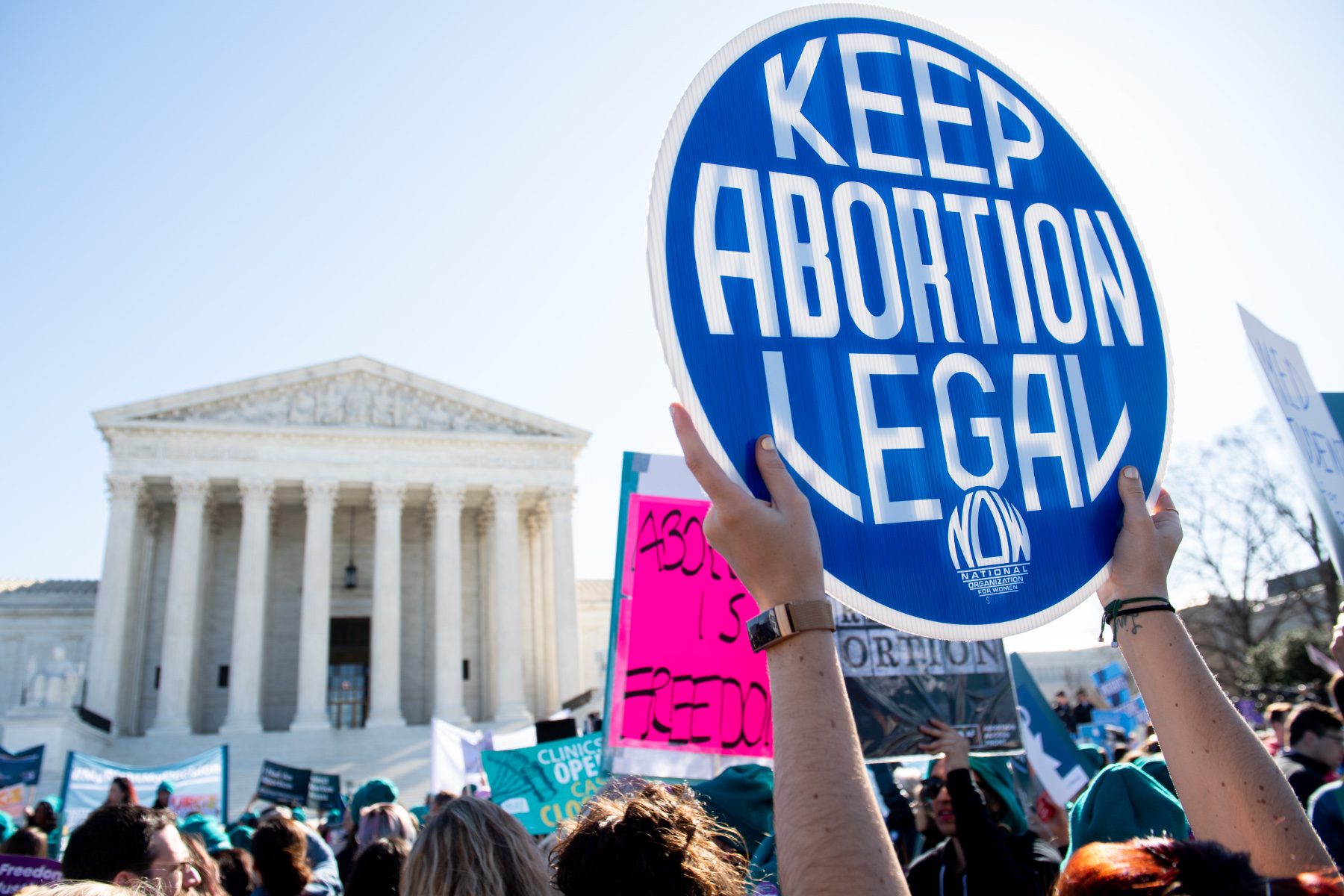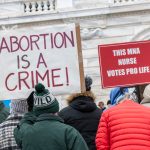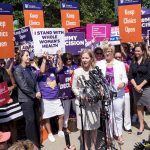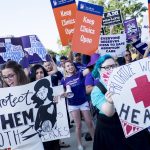The U.S. Supreme Court’s decision this week not to block a Texas law that bans most abortions raises questions about the future of Roe v. Wade, the landmark ruling guaranteeing the right to an abortion. And it worries criminal defense attorneys, who have been sounding the alarm on the legal ramifications of restricting reproductive rights.
Their warning: If the 1973 ruling is overturned, far more people will face criminal charges, including pregnant people seeking abortions and those who help them access them — even people who inadvertently end a pregnancy.
“Prosecutors really have no compunction about throwing people in jail for their reproductive outcomes,” said Farah Diaz-Tello, senior counsel and legal director of If/When/How: Lawyering for Reproductive Justice, a group that helps people who face criminal charges related to abortion. “Even though Roe has not been full protection, it is one of the things that sort of stands between people and much more massive scale of criminalization.”
The Republican lawmakers who have introduced sweeping abortion restrictions in statehouses this year — 2021 is on track to see a record number of related bills — have repeatedly promised that their legislation won’t criminally target a pregnant person who gets an abortion.
But Lynn M. Paltrow said even if that is lawmakers’ intent, it doesn’t mean it won’t happen. She is the executive director of National Advocates for Pregnant Women, a group that provides pro bono criminal and civil defense services on behalf of people who face charges as a result of abortions, miscarriages or stillbirth.
“It’s a hoax that they’re claiming that a prohibition on an arrest of a woman for having an abortion or stillbirth in one criminal law protects them from prosecution under all of the possible criminal laws,” she said. “It’s a giant hoax.”
Paltrow’s assessment comes in part from the fact that criminal cases around pregnancy and abortion have been going on for years. A cursory review of recent incidents shows part of the blueprint:
- In Indiana, Purvi Patel was convicted of feticide in 2015 after she was accused of ending her pregnancy with abortion-inducing pills. The feticide law in her case had been previously used to prosecute attacks on pregnant people. She was sentenced to 20 years in prison, but the Indiana Court of Appeals overturned her feticide conviction in 2016. (Patel was resentenced for a child neglect charge but had served enough time to be immediately released.) Her case included legal counsel from National Advocates for Pregnant Women.
- In Pennsylvania, Jennifer Whalen was accused of ordering similar medication online for her pregnant teenage daughter, who used it to terminate a pregnancy. Whalen, then a mother of three, said she was unaware of a state law that required the medicine to be administered by a physician to perform an abortion. She was sentenced in 2014 to serve between nine to 18 months of jail time.
- In Arkansas, Keysheonna Reed says she miscarried twins in 2018. She told authorities that she panicked and buried them in a suitcase. “I had a miscarriage, those babies that were found were mine. I had them at home and got scared,” Reed said according to KAIT-TV. She was charged with two counts of abuse of a corpse and her case is still pending.
- Chelsea Becker of California was charged with murder after she delivered a stillborn baby in 2019 after ingesting methamphetamine. Attorneys for Becker, including legal counsel from National Advocates for Pregnant Women, argued that California’s murder law says only third parties who attack a pregnant person and cause the person to lose their pregnancy can face prosecution for a fetal death. (The statute itself also says it may not be used against “the mother of the fetus”.) In addition, attorneys argued there was no proof that the methamphetamine caused the stillbirth. A judge dismissed the case this year.
- Another similar case out of California involves Adora Perez, who delivered a stillborn baby in 2018 and was also charged with murder after she was accused of methamphetamine use. She remains in prison, serving an 11-year sentence. Her case continues to worry attorneys, who believe it opens the door for further prosecutions around stillbirths and miscarriages.
Paltrow noted that in the cases of Perez and Becker, neither woman was seeking an abortion.
“They didn’t end their pregnancy through an abortion, but they’re still liable for the fact that their pregnancy ended anyway,” she said.
Nina Ginsberg is a criminal defense attorney and past president of the National Association of Criminal Defense Lawyers (NACDL). She helped author a report released last month looking at the legal landscape for future prosecutions if Roe is overturned. Among the findings: an increase in state laws that redefine “personhood” to include “an unborn child.” That change expands the scope of criminal liability for offenses such as homicide, feticide and aggravated assault — and could include abortion.
“There’s a whole aspect of overcriminalization and resulting mass incarceration that the public, and probably even most legislators that are passing these statutes, have not focused on,” she said.
Rafa P. Kidvai is director of the Repro Legal Defense Fund, a new fund launched earlier this year through If/When/How that will help pay legal costs for people who are investigated, arrested or prosecuted for “self-managed abortions” — meaning they attempt to end their pregnancy without a doctor or health care provider. Kidvai worries more prosecutions of such abortions will disproportionately impact marginalized people, including low-income people who are unable to travel to seek care.
“Anytime that there’s any limitation or restriction placed on abortion, you’re going to have people that are forced to self manage, because it is the safest way to do so,” Kidvai said. “And in a climate where we’ve decided there’s so much stigma around this issue and people are doing things that are ‘wrong,’ I think ‘wrong’ is so often conflated with ‘therefore should be a crime.’”
In 2013, Paltrow, another author of the NACDL report, co-authored a study that tallied 413 instances between 1973 and 2005 in which a person’s pregnancy led to cases that included their arrest, detentions or other forced intervention.
Among the study’s key findings:
- In 86 percent of the cases, the criminal statute used against the pregnant person was meant for other purposes — most frequently child abuse or child endangerment.
- Women in the study were overwhelmingly “economically disadvantaged,” regardless of race; 71 percent qualified for indigent defense.
- Of the 368 women for whom information on race was available, 59 percent were women of color; 52 percent were categorized as African American.
The available data on race highlights another conclusion from the NACDL report: Anti-abortion legislation disproportionately impacts Black women and other women of color. It also impacts poor people. In 2014, low-income people accounted for 75 percent of all abortions. And when a low-income person is denied access to an abortion, research shows they’re more likely to fall further into poverty.
Diaz-Tello noted that the new Texas law empowers private citizens to sue someone who “aids or abets” a person seeking an abortion after six weeks of pregnancy. She wondered about potential scenarios where a person is interrogated for having a “suspicious” miscarriage or is merely suspected of helping someone obtain an abortion. As If/When/How has highlighted in its own review of cases, being detained or facing misdemeanor charges can lead to a loss of work and child care, as well as stigma. The group estimates that since 2000, there have been at least 21 arrests of people “accused of a crime for ending a pregnancy or helping a loved one do so”.
“This is the kind of thing that this Texas law is aimed at. It’s saying, ‘Oh, no, we’re not going to go after the individual for ending their own pregnancy, we’re going to go after the people who surround them.’ How do you do that when the person who is most visible to the system is the individual who ends their own pregnancy?” she said. “And you don’t have to be convicted of a crime to have your life destroyed by being arrested, by being charged, by having your mug shot in the local police blotter reports.”
Kidvai said the Repro Legal Defense Fund has set aside $2 million to help defend people, including those who may be accused under the new Texas law, and is accepting donations to cover bail and other litigation expenses.
“This is a really scary time where I think people are definitely going to be surveilled,” they said. “And we know that the state is not going to step in to protect intrusions into people’s bodies.”






